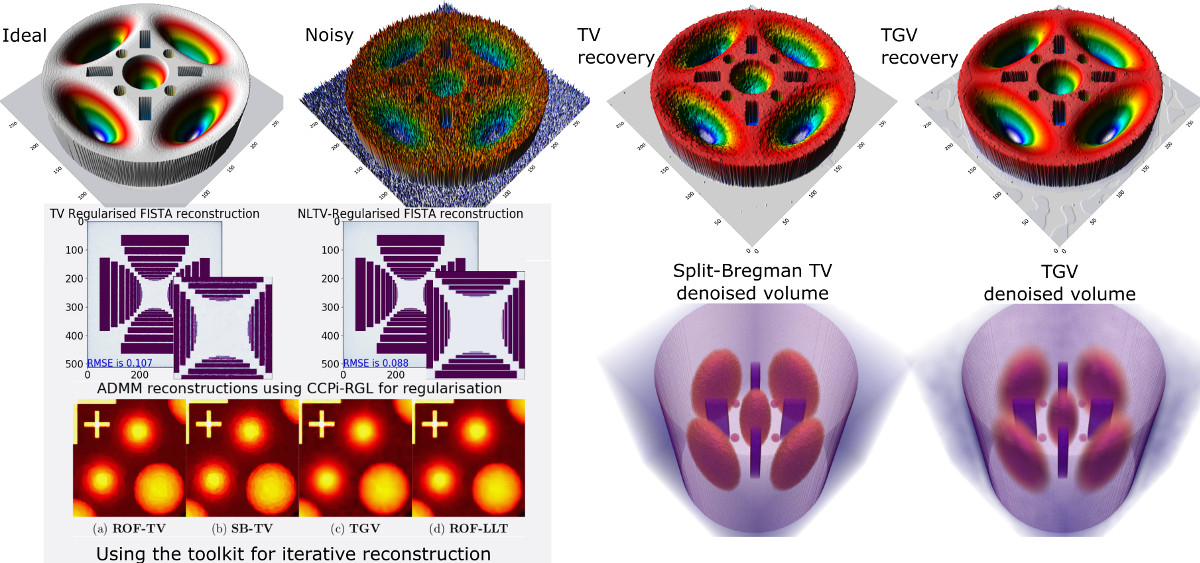CCPi-Regularisation Toolkit (Software X paper)
| Master | Development | Anaconda binaries |
|---|---|---|
Iterative image reconstruction (IIR) methods frequently require regularisation to ensure convergence and make inverse problem well-posed. The CCPi-Regularisation Toolkit (CCPi-RGL) toolkit provides a set of 2D/3D regularisation strategies to guarantee a better performance of IIR methods (higher SNR and resolution). The regularisation modules for scalar and vectorial datasets are based on the proximal operator framework and can be used with proximal splitting algorithms, such as PDHG, Douglas-Rachford, ADMM, FISTA and others. While the main target for CCPi-RGL is tomographic image reconstruction, the toolkit can be used for image denoising and inpaiting problems. The core modules are written in C-OMP and CUDA languages and wrappers for Matlab and Python are provided.
- MATLAB OR
- Python (tested ver. 3.5/2.7); Cython
- C compilers
- nvcc (CUDA SDK) compilers
- Rudin-Osher-Fatemi (ROF) Total Variation (explicit PDE minimisation scheme) 2D/3D CPU/GPU (Ref. 1)
- Fast-Gradient-Projection (FGP) Total Variation 2D/3D CPU/GPU (Ref. 2)
- Split-Bregman (SB) Total Variation 2D/3D CPU/GPU (Ref. 5)
- Total Generalised Variation (TGV) model for higher-order regularisation 2D/3D CPU/GPU (Ref. 6)
- Linear and nonlinear diffusion (explicit PDE minimisation scheme) 2D/3D CPU/GPU (Ref. 8)
- Anisotropic Fourth-Order Diffusion (explicit PDE minimisation) 2D/3D CPU/GPU (Ref. 9)
- A joint ROF-LLT (Lysaker-Lundervold-Tai) model for higher-order regularisation 2D/3D CPU/GPU (Ref. 10,11)
- Nonlocal Total Variation regularisation (GS fixed point iteration) 2D CPU/GPU (Ref. 12)
- Fast-Gradient-Projection (FGP) Directional Total Variation 2D/3D CPU/GPU (Ref. 3,4,2)
- Total Nuclear Variation (TNV) penalty 2D+channels CPU (Ref. 7)
- Linear and nonlinear diffusion (explicit PDE minimisation scheme) 2D/3D CPU (Ref. 8)
- Iterative nonlocal vertical marching method 2D CPU
The package comes as a CMake project and additional wrappers for Python and Matlab.
To install precompiled binaries, you need conda and install from ccpi channel using :
conda install ccpi-regulariser -c ccpi -c conda-forge
In order to compile C/C++ sources and additional wrappers from source code for numpy 1.12 and python 3.6, the recommended way is:
git clone https://github.com/vais-ral/CCPi-Regularisation-Toolkit
cd CCPi-Regularisation-Toolkit
export CCPI_BUILD_ARGS="--numpy 1.12 --python 3.6"
build/jenkins-build.sh
this will install conda build environment and compiles C/C++ and Python wrappers and performs basic tests for environment with python 3.6 and numpy 1.12.
If you want to build directly using cmake, install CMake (v.>=3) to configure it. Additionally you will need a C compiler, make (on linux) and CUDA SDK where available. The toolkit may be used directly from C/C++ as it is compiled as a shared library (check-out the include files in Core for this)
- Clone this repository to a directory, i.e.
CCPi-Regularisation-Toolkit, - create a build directory.
- Issue
cmaketo configure (orcmake-gui, orccmake, orcmake3). Use additional flags to fine tune the configuration.
Flags used during configuration
| CMake flag | type | meaning |
|---|---|---|
BUILD_PYTHON_WRAPPER |
bool | ON|OFF whether to build the Python wrapper |
BUILD_MATLAB_WRAPPER |
bool | ON|OFF whether to build the Matlab wrapper |
CMAKE_INSTALL_PREFIX |
path | your favourite install directory |
PYTHON_DEST_DIR |
path | python modules install directory (default ${CMAKE_INSTALL_PREFIX}/python) |
MATLAB_DEST_DIR |
path | Matlab modules install directory (default ${CMAKE_INSTALL_PREFIX}/matlab) |
BUILD_CUDA |
bool | ON|OFF whether to build the CUDA regularisers |
CONDA_BUILD |
bool | ON|OFF whether it is installed with setup.py install |
Matlab_ROOT_DIR |
path | Matlab directory |
PYTHON_EXECUTABLE |
path | /path/to/python/executable |
Here an example of build on Linux (see also run.sh for additional info):
git clone https://github.com/vais-ral/CCPi-Regularisation-Toolkit.git
cd build
cmake .. -DCONDA_BUILD=OFF -DBUILD_MATLAB_WRAPPER=ON -DBUILD_PYTHON_WRAPPER=ON -DBUILD_CUDA=ON -DCMAKE_BUILD_TYPE=Release -DCMAKE_INSTALL_PREFIX=./install
make install
cd install/python
export LD_LIBRARY_PATH=${LD_LIBRARY_PATH}:../libPython binaries are distributed via the ccpi conda channel. Currently we produce packages for Linux64, Python 2.7, 3.5 and 3.6, NumPy 1.12 and 1.13.
conda install ccpi-regulariser -c ccpi -c conda-forge
export CIL_VERSION=19.10 (Unix) / set CIL_VERSION=19.10 (Windows)
conda build recipe/ --numpy 1.15 --python 3.7
conda install ccpi-regulariser=${CIL_VERSION} --use-local --force-reinstall
cd demos/
python demo_cpu_regularisers.py # to run CPU demo
python demo_gpu_regularisers.py # to run GPU demo
If passed CONDA_BUILD=ON the software will be installed by issuing python setup.py install which will install in the system python (or whichever other python it's been picked up by CMake at configuration time.)
If passed CONDA_BUILD=OFF the software will be installed in the directory pointed by ${PYTHON_DEST_DIR} which defaults to ${CMAKE_INSTALL_PREFIX}/python. Therefore this directory should be added to the PYTHONPATH.
If Python is not picked by CMake you can provide the additional flag to CMake -DPYTHON_EXECUTABLE=/path/to/python/executable.
Matlab wrapper will install in the ${MATLAB_DEST_DIR} directory, which defaults to ${CMAKE_INSTALL_PREFIX}/matlab
If Matlab is not picked by CMake, you could add -DMatlab_ROOT_DIR=<Matlab directory>.
Because you've installed the modules in <your favourite install directory> you need to instruct Matlab to look in those directories:
PATH="/path/to/mex/:$PATH" LD_LIBRARY_PATH="/path/to/library:$LD_LIBRARY_PATH" matlabBy default /path/to/mex is ${CMAKE_INSTALL_PREFIX}/bin and /path/to/library/ is ${CMAKE_INSTALL_PREFIX}/lib
On Windows the dll and the mex modules must reside in the same directory. It is sufficient to add the directory at the beginning of the m-file.
addpath(/path/to/library);
cd src/Matlab/mex_compile
compileCPU_mex.m % to compile CPU modules
compileGPU_mex.m % to compile GPU modules (see instructions in the file)
-
Kazantsev, D., Jørgensen, J.S., Andersen, M., Lionheart, W.R., Lee, P.D. and Withers, P.J., 2018. Joint image reconstruction method with correlative multi-channel prior for X-ray spectral computed tomography. Inverse Problems, 34(6) Results can be reproduced using the following SOFTWARE
- TOmographic MOdel-BAsed Reconstruction (ToMoBAR)
- Joint image reconstruction method with correlative multi-channel prior for X-ray spectral computed tomography (MATLAB code)
CCPi-RGL software is a product of the CCPi group and STFC SCD software developers. Any relevant questions/comments can be e-mailed to Daniil Kazantsev at dkazanc@hotmail.com
